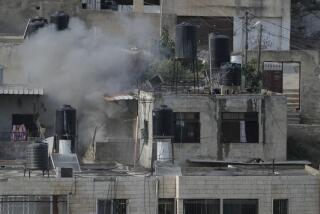U.S. Troops, Muslims Clash After Bosnia Weapons Raid
- Share via
CELIC, Bosnia-Herzegovina — U.S. troops caught between battling factions of Bosnian Muslims and Serbs on Thursday seized tons of weapons from the Bosnian army and clashed with rioting Muslim mobs.
It was the latest escalation in a tense confrontation between Muslim refugees trying to regain homes--and illegally using weapons to do so--and Bosnian Serbs determined to block them.
Increasingly, U.S. forces are being drawn into the fray and seeming to serve as a last barrier to renewed warfare. The violence--some of the worst since warfare stopped nearly a year ago--dramatizes the need for a continued presence of international peacekeepers in the still-explosive Bosnia-Herzegovina and the dangers that such a mission faces.
Thursday’s weapons raids by units from the U.S. Army’s 1st Infantry Division followed two days of firefights between Bosnian Serb police and Muslim troops and civilians attempting to resettle the deserted village of Gajevi near here in a supposedly demilitarized zone on the edge of Serb territory. At least one Muslim was killed.
A senior officer from the Muslim-led Bosnian government army was seen leading military-age men into Gajevi, according to North Atlantic Treaty Organization officers who labeled the action a clear provocation.
As punishment, U.S. NATO troops raided the nearest Bosnian army brigade headquarters and weapons storage warehouse, just outside Celic in northeastern Bosnia, seizing two armored vehicles, about 200 Kalashnikov assault rifles, machine guns, grenade launchers and ammunition filling two 5-ton trucks.
“Our actions today are not about [NATO] restrictions on freedom of return,” U.S. Army Maj. Gen. Montgomery C. Meigs, commander of U.S. troops in Bosnia, said at a news conference later. “They are about keeping [an] armed settlement from reigniting the powder keg of factional distrust that could lead to another war.”
Muslim residents of Celic were furious. When the loaded NATO trucks began to pull out of the area, about 60 miles north of Sarajevo, scores of Muslims blocked the road, some lying in the path of the vehicles. Shoving matches erupted between Bosnians and U.S. soldiers attempting to clear the road, while people in the crowd spat and hurled bottles and debris at the troops.
U.S. Army helicopters were called in, swooping so low over the crowd that some people had trouble keeping their balance while clouds of dust and trash filled the air.
“They were brutal,” a Muslim homemaker in Celic said later. “We couldn’t believe how violent they were.”
U.S. Army Col. Mike Thompson said several of his men were injured in the scuffles, though none seriously.
Under the U.S.-brokered peace agreement that halted Bosnia’s 3 1/2-year war, more than 2 million refugees are promised the right to return to their homes. Secretary of State Warren Christopher reiterated that right this week at a Paris conference on Bosnia.
Although NATO and U.N. officials have insisted that resettlement efforts be orderly, hard-line nationalists, particularly Bosnian Serbs and Croats, have prevented virtually all cross-ethnic returns. Muslim officials have responded by infiltrating armed men into villages along with refugees attempting to resettle--a pattern repeated now in four locations, according to NATO officials.
In several villages where Muslims have attempted or were planning to return, homes have been blown up or torched in the middle of the night.
International mediators have suspended all resettlement efforts along the 600-mile-long boundary between the Muslim and Serb halves of Bosnia after the violence in Gajevi.
“We think these people [the refugees] are genuinely frustrated,” British Maj. Simon Haselock, a NATO spokesman, said Thursday. “But their frustration is being taken advantage of by local leaders.”
For example, Meigs, the U.S. commander, said 130 Muslims had applied to “go home” to Gajevi--even though there are only 12 homes in the village.
“Local officials have failed to control the violent actions of their constituents and have not exercised the appropriate leadership in seeking peaceful solutions to problems associated with the return issue,” Meigs said.
He was speaking at the U.S. Army’s Camp McGovern, about 10 miles north of Celic, where all the weapons confiscated from the Bosnian army were being destroyed.
The Bosnian army unit, the 254th Brigade, was ordered disbanded by NATO--a highly unusual and potentially controversial action.
Meigs said the Bosnian Serbs also were “not clean.” A smaller cache of weapons was confiscated from a Republika Srpska police station in nearby Koraj, a formerly Muslim town now in Serb hands.
It is the Muslim side, though, that is receiving the most upbraiding, and government officials are not happy. Bosnian state-controlled radio Thursday night adopted an unusually anti-American tone, saying a “different, postelectoral” attitude seemed now to be dominating U.S. policy and actions, referring to President Clinton’s recent reelection.
In another incident that NATO insisted was unrelated, Gen. Rasim Delic, the commander of the Bosnian army, was stopped for 45 minutes by French NATO troops who searched his car. An angry Delic said the French had trained weapons on him and damaged his Audi.
* GIs MAY STAY ON: Clinton administration has shown readiness to keep troops in Bosnia, NATO chief says. A6
More to Read
Sign up for Essential California
The most important California stories and recommendations in your inbox every morning.
You may occasionally receive promotional content from the Los Angeles Times.











